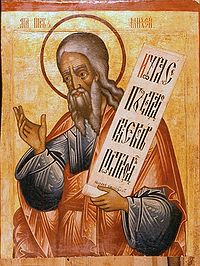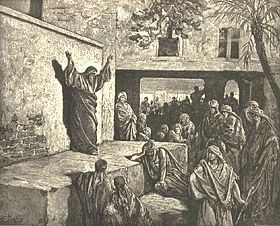- Micah (prophet)
-
Saint Micah the Prophet 
Russian Orthodox icon of the Prophet Micah, 18th century (Iconostasis of Transfiguration Church, Kizhi Monastery, Karelia, Russia).Prophet, Warner Born c. 740 B.C.E.
MoreshethDied c. 670 B.C.E. Honored in Judaism
Christianity (Armenian Apostolic Church, Roman Catholic Church, Eastern Orthodox Church)Feast July 31 Micah, meaning “who is like Yahweh,"[1] was a prophet who prophesied from approximately 737-690 BC in Judah and is the author of the Book of Micah. He was a contemporary of the prophets Isaiah, Amos and Hosea and is considered one of the twelve minor prophets of the Tanakh (Old Testament). Micah was from Moresheth-Gath, in southwest Judah. He prophesied during the reigns of Jotham, Ahaz, and Hezekiah of Judah. Micah’s messages were directed chiefly toward Jerusalem. He prophesies the future destruction of Jerusalem and Samaria, the destruction and then future restoration of the Judean state, and he rebukes the people of Judah for dishonesty and idolatry. His prophecy that the Messiah would be born in the town of Bethlehem is recalled in the Book of Matthew.
Contents
Background
Micah was active in Judah from before the fall of Samaria in 722 BC and experienced the devastation brought by Sennacherib’s invasion of Judah in 701 BC. He prophesied from approximately 737-690 BC. Micah was from Moresheth, also called Moresheth-Gath, a small town in southwest Judah. Micah lived in a rural area, but often rebuked the corruption of city life in Israel and Judah.[1]
Micah prophesied during the reigns of Jotham, Ahaz, and Hezekiah of Judah. Jotham, the son of Uzziah, was king of Judah from 742 – 735 BC. Jotham was succeeded by his son Ahaz, who reigned over Judah from 735 – 715 BC. Then Ahaz’s son Hezekiah ruled from 715 – 696 BC.[2] Micah was a contemporary of the prophets Isaiah, Amos, and Hosea. Jeremiah, who prophesied about thirty years after Micah, recognizes Micah as a prophet from Moresheth who prophesied during the reign of Hezekiah.[3]
Message
Micah’s messages were directed mainly towards Jerusalem, and were a mixture of denunciations and prophecies. In his early prophecies, he predicts the destruction of both Samaria and Jerusalem for their respective sins. The people of Samaria are rebuked for worshipping idols which were bought with the income earned by prostitutes.[4] Micah was the first prophet to predict the downfall of Jerusalem. According to him, the city was doomed because its beautification was financed by dishonest business practices, which impoverished the city’s citizens.[5] He also called to account the prophets of his day, whom he accused of accepting money for their oracles.[6]
Micah also anticipates the destruction of the Judean state and promises its restoration more glorious than before.[7] He prophesies an era of universal peace over which the Lord will preside from Jerusalem.[8] Micah also declares that when the glory of Zion and Jacob is restored that the LORD will force the Gentiles to abandon idolatry.[9]
Micah also rebukes Israel because of dishonesty in the marketplace and corruption in government. He threatens them on behalf of God with destruction. He tells them what the LORD requires of them:
He has shown you, O mortal, what is good. And what does the LORD require of you? To act justly and to love mercy and to walk humbly with your God.
— Micah 6:8 , NIV
Israel’s response to Micah’s charges and threats consists of three parts: an admission of guilt,[10] a warning of adversaries that Israel will rely on the LORD for deliverance and forgiveness,[11] and a prayer for forgiveness and deliverance.[12]
Another prophecy given by Micah details the future destruction of Jerusalem and the plowing of Zion (a part of Jerusalem). This passage (Micah 3:11-12), is stated again in Jeremiah 26:18, Micah’s only prophecy repeated in the Old Testament. Since then Jerusalem has been destroyed three times, the first one being the fulfillment of Micah’s prophecy. The Babylonians destroyed Jerusalem in 586 BC, about 150 years after Micah gave this prophecy.[13][14]
Elsewhere in the Bible
Micah is described and his prophecies fulfilled in several places in the Bible. In Micah 5:2, there is a prophecy that reveals that Bethlehem, a small village just south of Jerusalem, would be the birthplace of the Messiah.
But you, Bethlehem Ephrathah, though you are small among the clans of Judah, out of you will come for me one who will be ruler over Israel, whose origins are from of old, from ancient times.
— Micah 5:2, NIV
This prophecy eliminates all other cities and towns in the world as places in which the Messiah could be born. This passage and prophecy closely corresponds with Matthew 2:6, and the fulfillment of this prophecy in the birth of Jesus is further described in Matthew 2:1-6.
But you, Bethlehem, in the land of Judah, are by no means least among the rulers of Judah, for out of you will come a ruler who will shepherd my people Israel.
— Matthew 2:6, NIV
In Matthew 10:35-36, Jesus quotes directly from Micah 7:6, saying:
For a son dishonors his father, a daughter rises up against her mother, a daughter-in-law against her mother-in-law - a man's enemies are the members of his own household.
— Matthew 10:35-36, NIV
Micah is referring to the division in Judah and Samaria, the distrust that has arisen between all citizens, even within families.[14] Jesus is using the same words to describe something different. Jesus says that he did not come to bring peace, but to divide households. Men are commanded to love Jesus Christ more than their own family members, and Jesus says this priority will lead to persecution from others and separation within families.[15]
In Micah 7:20, Micah reminds Judah of God’s covenant to be merciful to Jacob and show love to Abraham and his descendants. This is repeated in Luke 1:72-73, the song of Zechariah when the Holy Spirit fills him and prophesies through him about Zechariah’s son, John the Baptist. This prophecy concerns the kingdom and the salvation through the Messiah. It is a step in the fulfillment of the blessing of the descendants of Abraham.[15] When Micah restates this covenant promise, he is comforting Judah with the promise of God’s faithfulness and love.[16]
 Engraving of the Prophet Micah by Gustave Doré.
Engraving of the Prophet Micah by Gustave Doré.
Liturgical commemoration
He is commemorated with the other minor prophets in the Calendar of saints of the Armenian Apostolic Church on July 31.
In the Eastern Orthodox Church he is commemorated twice in the year. The first feast day is January 5 (for those churches which follow the traditional Julian Calendar, January 5 currently falls on January 18 of the modern Gregorian Calendar). However, since January 5 is also the Eve of the Theophany (Epiphany), his major celebration is on August 14 (the forefeast of the Dormition).
References
- ^ a b “Micah”, New Bible Dictionary, Second Edition, Tyndale Press, 1987 p. 772.
- ^ “Micah, Book of”, New Bible Dictionary, Second Edition, Tyndale Press, 1987 p. 772-773.
- ^ Jeremiah 26:18; Jeremiah 26. Henry, Matthew. Matthew Henry’s Concise Commentary on the Whole Bible. Thomas Nelson Publishers, 2000. Page 589.
- ^ Micah 1:7; “Micah, Book of”, The Illustrated Dictionary and Concordance of the Bible, The Jerusalem Publishing House, Ltd., 1986. p. 688-689.
- ^ Micah 2:1-2; “Micah, Book of”, The Anchor Bible Dictionary. Volume 4. Bantan Doubleday Dell Publishing Group, 1992. p. 807-810
- ^ Micah 3:5-6; “Micah”, New Bible Dictionary, Second Edition, Tyndale Press, 1987 p. 772.
- ^ Micah 5:6-8; Micah, a translation with notes from J. Sharpe. Micah (the prophet), ed. John Sharpe. 1876. Oxford University Press. pp 33-34
- ^ Micah 5:1-2; The History of the Hebrew Nation and its Literature with an appendix on the Hebrew chronology. Sharpe, Samuel. Harvard University Press, 1908. p. 27
- ^ Micah 5:10-15; “Micah, Book of”, The Illustrated Dictionary and Concordance of the Bible, The Jerusalem Publishing House, Ltd., 1986. p. 688-689.
- ^ Micah 7:1-6; Micah: A Commentary. Mays, James Luther. Old Testament Library. Westminster John Knox Press, 1976. ISBN 9780664208172. p. 131-133.
- ^ Micah 7:7-13; Micah, a translation with notes from J. Sharpe. Micah (the prophet), ed. John Sharpe. 1876. Oxford University Press.
- ^ Micah 7:14-20; “Micah, Book of”, New Bible Dictionary, Second Edition, Tyndale Press, 1987 p. 772-773
- ^ The History of the Hebrew Nation and its Literature with an appendix on the Hebrew chronology. Sharpe, Samuel. Harvard University Press, 1908. p. 27
- ^ a b Micah: A Commentary. Mays, James Luther. Old Testament Library. Westminster John Knox Press, 1976. ISBN 9780664208172. p. 131-133.
- ^ a b Matthew 10. Henry, Matthew. Matthew Henry’s Concise Commentary on the Whole Bible. Thomas Nelson Publishers, 2000. Page 381.
- ^ Micah 7. The Holy Bible, containing the Old and New Testaments…with commentary and notes by Adam Clarke. Clarke, Adam. Columbia University, 1833. p. 347.
Bibliography
- Delbert R. Hillers, Micah (Minneapolis, Fortress Press, 1984) (Hermeneia).
- Bruce K. Waltke, A Commentary on Micah (Grand Rapids, Eerdmans, 2007).
- Mignon Jacobs, Conceptual Coherence of the Book of Micah (Sheffield, Sheffield Academic Press, 2009).
- Yair Hoffman, "The Wandering Lament: Micah 1:10-16," in Mordechai Cogan and Dan`el Kahn (eds), Treasures on Camels' Humps: Historical and Literary Studies from the Ancient Near East Presented to Israel Eph`al (Jerusalem, Magnes Press, 2008),
External links
- Prophet Micah Orthodox icon and synaxarion for January 5
- Prophet Micah Orthodox icon and synaxarion for August 14
- Historical and Literary Overview
Prophets in the Hebrew Bible Pre-Patriarchs (Bible) Patriarchs and Matriarchs Israelite prophets
in the TorahProphets mentioned
in the Former ProphetsMajor Prophets Minor Prophets Noahide prophets Other prophets Italics denote that the status as a prophet is not universally accepted. · rl are articles dealing with the prophet within Rabbinic Literature.Categories:- Prophets of the Hebrew Bible
- 8th-century BC people
- Old Testament saints
Wikimedia Foundation. 2010.
